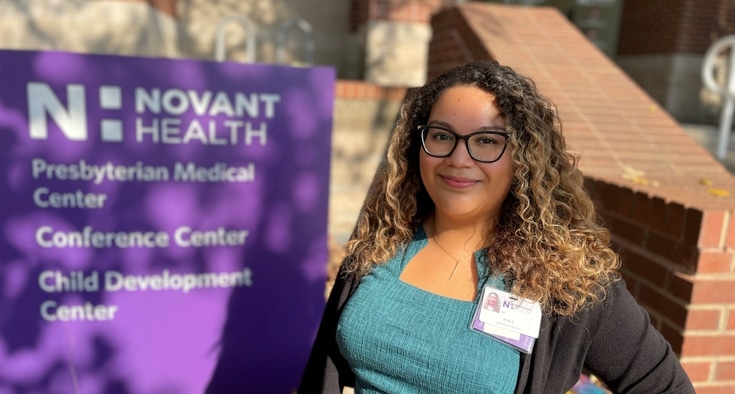She’s Helping Expectant Moms Find the Prenatal Care They Need
It’s part of a Novant Health effort to address disparities in maternal and infant health.

Novant Health is taking big steps to help close the disparity gap in maternal and infant health for minorities – and Kimberly Cifuentes is helping to pave the way. Working as a health educator in Charlotte since August, she’s striving to get pregnant women the early and adequate prenatal care they need. And deserve.
It’s just one piece of a multi-front effort at Novant Health to address disparities in maternal and infant health. Another key piece: bias training for doctors, certified nurse midwives and other clinicians in pediatrics and obstetrics. The goal: Help clinicians recognize biases that stand in the way of delivering the best possible health care to all patients. Black expectant mothers in the U.S. are three times more likely to die from a pregnancy-related cause than white women. Latina women face disparities in care as well.
Cifuentes follows up with patients who have recently tested positive for pregnancy in any Novant Health primary care, urgent care or emergency department. If the patient hasn’t already booked their first prenatal visit, Cifuentes makes it her mission to encourage the patient to do so or help schedule it.
“It is very important to have an initial prenatal check prior to the 14-week mark of pregnancy to ensure that both mom and baby are healthy and thriving,” Cifuentes said.
In 2021, researchers found that 1 in 6 infants in North Carolina were born to women receiving inadequate prenatal care. Research shows that those babies are three times more likely to have low birth weight and five times more likely to die.
For Cifuentes, addressing barriers that pregnant minorities face is personal. She remembers being a 7-year-old child, translating for her Guatemalan-born, Spanish-speaking mother at doctor’s appointments, wondering if she’d gotten it right.
“Whether it was insurance documents, legal documents or translating a doctor’s appointment,” she said. “At that age, I could never be 100 percent sure if I translated everything correctly after we left because some of the medical terminology that was used during those visits was simply too high above my grade level at the time for me to fully understand. However, back then, I was, more often than not, the only interpreting resource my mom had.”
So she knows what it’s like for expectant moms who may have limited access to health care and face the added burden of a language barrier. It also helps that she speaks fluent Spanish.
“I’m able to reach patients on a personal level, because I can say, ‘Hey, look, I’ve gone through this,’” Cifuentes said. “I grew up in a low-income, non-English-speaking family. I know what you’re going through.”
She can help patients figure out how to file their insurance or what to do if they don’t have insurance. She makes sure they’re set up with interpreters for doctor visits. She can provide resources to help with transportation to and from doctor’s visits. She helps match the patients up with Novant Health doctors and other clinicians who are most convenient to them.
“The hardest part of it all for patients is getting started,” Cifuentes said. “Because once you’re connected, for the most part, clinics and hospitals can connect you to interpreter services and any additional resources you may need.”
When she began this role in August, about 73 percent of patients who delivered babies at a Novant Health facility had received prenatal care – or were under the care of an ob-gyn before the baby had reached 14 weeks gestation. That percentage has already begun to improve, with a goal of reaching 80 percent.
And her goal is to get pregnant patients in to see their doctors between the seven to 14-week mark of gestation at the latest.
She’s already making an impact in Charlotte. She might be tracking 40 to 45 women at any given time, and she estimates she is making prenatal appointments for more than half of them.
While Cifuentes currently serves Charlotte, Novant Health is looking to expand these services to Winston-Salem and Wilmington.
“For me, it’s very fulfilling,” she said. “I’m definitely the type of person that has to feel like I am making a positive and meaningful impact on people’s lives. In this role I am bringing both value and a feeling of security and safety to people during life-changing times of uncertainty. That is so important to me. My job kind of brings it full circle.”